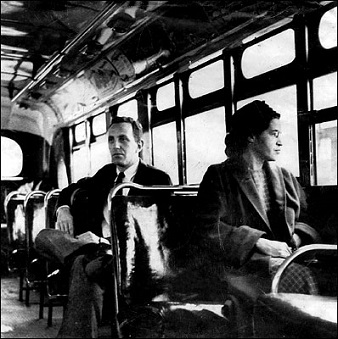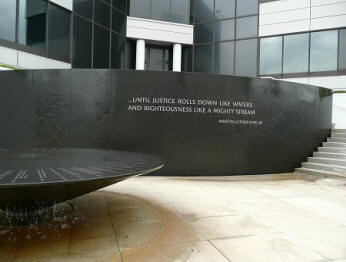[AUTHENTICITY CERTIFIED: Text version below transcribed directly from audio]1
Today is a special day for me and I remember a number of weeks ago when Senator Abraham and I discussed the possibility of awarding a Congressional Gold Medal to Rosa Parks. It was an idea that we thought was a good one, and I'm glad to see it moving rapidly to fruition. I certainly believe that the Congressional Gold Medal is a very distinguished award that ought to be preserved for the most exceptional circumstances and persons, and I certainly believe the one today that we will honor meets all the qualities.
So I am pleased to honor a native Alabamian who, through her life and through her example, has touched both the heart and conscience of an entire nation. I speak, of course, of Ms. Rosa Parks, a native of Tuskegee and a former resident of Montgomery whose dignity in the face of discrimination helped spark a movement to ensure that all citizens were treated equally under the law.
Equal treatment under the law is a fundamental pillar upon which our Republic rests. In fact, over the first two months of this year, this Senate was engaged in a Constitutional debate over the scope and meaning of this very concept. As legislators we should work to strengthen the appreciation for this important, fundamental governing principle by recognizing those who make extraordinary contributions towards ensuring that all American citizens have the...opportunity, regardless of their race, sex, or creed, or national origin, to enjoy the freedoms that this country has to offer.
Through her efforts, Mrs. Parks has come to be a living embodiment of this principle, and it is entirely appropriate that this Congress take this opportunity to acknowledge her contribution by authorizing the award of a Congressional gold medal to her. Her courage, what we may call "gumption," resulted in historic change. Certainly there is much still to be done. True equality, the total elimination of discrimination, and a real sense of ease and acceptance among the races has not yet been fully achieved. But it is fair to say that in the history of this effort, the most dramatic and productive chapter was ignited by the lady we seek to honor today.
Mrs. Parks' story is well known, but it bears repeating. She was born on February 4th, 1913, in the small town of Alabama -- Tuskegee, Alabama, to Mr. James and Mrs. Leona McCauley. As a young child, she moved to Montgomery with her mother, who was a local schoolteacher. Like many Southern cities, [the] Montgomery of Mrs. Parks' youth was a segregated city with a [sic] numerous laws mandating the separate and unequal treatment of people based solely upon the color of their skin.
These laws were discriminatory [in their] intent, and divisive, unfair, and humiliating in their application. But for years Mrs. Parks had suffered with them until that fateful day of December 1, 1955, when her pride and dignity would not allow her to obey them any more.

On this day Mrs. Parks, a 42 year old seamstress, boarded a city bus after a long, hard day at work. Like other public accommodations, this bus contained separate sections for white passengers and black passengers. White passengers were allocated the front rows. The black passengers were given the back rows.
This bus was particularly crowded that evening. At one of the stops, a white passenger boarded, and the bus driver, seeing Mrs. Parks, requested that she give up her seat and move to the back of the bus, even though this meant that she would be forced to stand for the rest of the trip. Mrs. Parks refused to give up her seat and was arrested for disobeying the bus drivers order.
For her act of civic defiance, Mrs. Parks set off a chain of events that have led some to refer to her as the "Mother of the Civil Rights Movement." Her arrest led to the Montgomery Bus Boycott, an organized movement led by a young minister named Martin Luther King, Jr., who had begun preaching at the historic Baptist church located on Montgomery's Dexter Avenue.
The bus boycott lasted 382 days, and its impact directly led to the integration of bus lines while the attention generated helped lift Dr. King to national prominence. Ultimately, the United States Supreme Court was asked to rule on the constitutionality of the Montgomery law, which Mrs. Parks had defied, and the court struck it down.2

That -- This powerful image, that of a hard working American ordered to the back of the bus just because of her race, was a catalytic event. It was the spark that caused a nation to stop accepting things as they had been and focused everyone on the fundamental issue: whether we could continue as a segregated society.
As a result of the movement Mrs. Parks helped start, today's Montgomery is a quite different city from the one of her youth. Today, the citizens of Montgomery look with a great deal of historical pride upon the church that once heard the sermons of Dr. King.

Montgomery is the home of the Civil Rights Memorial, a striking monument of black granite and cascading water which memorializes the individuals who gave their lives in pursuit of equal justice.
Today's Montgomery is a city in which its history as the "Capital of the Confederacy" and its history as the "Birthplace of the Civil Rights Movement" are both recognized and reconciled.

And soon, Troy State University of Montgomery will become the home of the "Rosa Parks Library and Museum" built on the very spot upon which Mrs. Parks was arrested in 1955, the old Empire Theater.
So I would like to briefly describe this important project. Troy State University Montgomery is an important university with over 3,400 full time students. They are in -- in the midst of constructing a 50,000 square foot library and museum on the land they own, which includes the exact location where Mrs. Parks was arrested in 1955. When completed, this museum will include a 3,700 square foot permanent exhibit focusing on the commemoration of the Montgomery Civil Rights Movement. This project memorializes an historic event that changed the city of Montgomery for the better, and I look forward to offering any support I can to aid in its completion.
Mrs. Parks' efforts helped spark the dynamic social changes which have made it possible for this kind of recognition to be supported by Montgomerians and Alabamians. But, in fact, Ms. Parks' contributions may extend beyond even the borders of our nation. In his book, Bus Ride to Justice, Mr. Fred Gray, who gained fame while in his 20s as Ms. Parks' attorney in the bus desegregation case, and one of the early African-American attorneys in Alabama -- and he was the lead attorney in many of Alabama's other famous civil rights cases -- he wrote in his book, and I do not believe it is an exaggeration, these words (quote):
Little did we know that we had set in motion a force that would ripple throughout Alabama, the South, and the nation, and even the world. But from the vantage point of almost 40 years later, there is a direct correlation between what we started in Montgomery and what has subsequently happened in China, eastern Europe, South Africa and [even] more recently, even in Russia. While it is inaccurate to say that we all sat down and deliberately planned a movement that would echo and reverberate around the world, we did work around the clock, planning strategy and creating an atmosphere that gave strength, courage, faith and hope to people of all races, creeds, colors and religions around the world. And it all started on a bus in Montgomery, Alabama, with Rosa Parks on December 1, 1955.3
For her courage, for her role in changing Alabama, the South, the nation, and the world for the better, our nation owes a great debt of thanks to Rosa Parks.
I hope that this body will extend its thanks and recognition to her by awarding her the Congressional Gold Medal.
 Book/CDs by Michael E. Eidenmuller, Published by
McGraw-Hill (2008)
Book/CDs by Michael E. Eidenmuller, Published by
McGraw-Hill (2008)
1 Audio enhanced with various filters and noise reduction technology. Brief pause in audio cut for continuity. All originally delivered content preserved.
2 Strictly, the U.S. Supreme Court reaffirmed the decision in Browder v. Gayle which was tried in the U.S. District Court for the Middle District of Alabama.
3 Though likely faithful in substance and style, the precision of this quotation, as delivered, is unconfirmed.
Audio Source: C-SPAN.org
Image #1 Source: https://commons.wikimedia.org/wiki/File:Rosaparks_busdiagram.jpg
Image #2 Source: https://en.wikipedia.org/wiki/Rosa_Parks#/media/File:Rosaparks_bus.jpg
Image #3 Source: https://upload.wikimedia.org/wikipedia/commons/5/5e/The_Civil_Rights_Memorial%2C_Montgomery%2C_AL.jpg
Image #4 Source: https://commons.wikimedia.org/wiki/File:Rosa_Parks_Library_and_Museum.jpg
Page Updated: 3/2/23
U.S. Copyright Status: This text and audio = Property of AmericanRhetoric.com. Images #1 and #3 = Public domain. Image #2 = Fair Use. Image #4 = Creative Commons 3.0 Unported.
